Although less than a three-hour drive from Winnipeg, Manigotagan seemed a world away. This Metis community of about 200 lives in the dense forest along the eastern shore of Lake Winnipeg. It abuts the much larger reserve community of Hollow Water (population 1,200) whose border has become more porous since the passing of Bill C-31 which returned treaty status to some of the Métis.
“Our people have lived in this area for centuries, ever since our ancestors crossed James Bay from Quebec and came up the river,” said Charles Simard, one of the members of Manigotagan Community Fellowship who warmly welcomed the three vans full of people who constituted the spring gathering of Partnership Circles.
Mennonite Church Manitoba congregations have been meeting together with their partner northern indigenous communities twice a year since 2002, to learn from each other and to strengthen their partnerships. For the first time this year, the meeting took place outside of Winnipeg.
Norman Meade, co-pastor of the Manigotagan Fellowship with Murray and Ruth Martin, told indigenous and settler participants, “The Spirit here is strong. We have built on the strength that people like Jake and Trudy Unrau have brought to us over the years.”
He expressed appreciation for the partnership their congregation and community has with Steinbach Mennonite Church. For more than 17 years, they have worked together to deliver a summer Vacation Bible School program. “It has not only influenced the 50 to 60 children that attend each year, but also impacted the adults in our community,” Meade said.
The Manigotagan meeting clearly demonstrated that indigenous communities have much to bring to the partnerships. This small chapel, which Simard had for years thought was “the little brown church in the vale that everyone sang about,” was a setting that gave the community the confidence to showcase its strengths and gifts.
A feast of moose stew, caribou stew, smoked lynx meat, delicate slices of moose nose, smoked whitefish and goldeye, and fresh bannock was laid out for the guests. The furs and pelts of local animals were shown, and lessons and stories were shared about the animal world around them and how the lives of people in this community are interwoven with their environment and how they work to look after it.
Simard shared some of his knowledge about the medicinal plants that he collects and uses for healing.
Bishop Mark MacDonald, the Anglican Church of Canada’s first national indigenous bishop, spoke at both Thunderbird House in Winnipeg and at the Partnership Circles event in Manigotagan the following day. There, MacDonald pulled a small, well-worn Ojibway translation of the Bible from his pocket and read John 3:16. (See "Western Christians need to get out of the way.")
“The gospel thrives on translation, on being made flesh, on interacting with people,” he explained. “In that way, the Bible is very unique. Whenever there is a time of cultural diffusion, that’s when Christianity does the best. You have to understand the essence of Christianity in order for it to take root in some other place or culture.”
In translating this famous passage, MacDonald said, “ ‘For God so loved the land that he gave his only begotten Son.’ In other words, we understand that we need to cherish this land and treat it with respect and reverence because God loved it so much that he gave us his only Son. It defines our way of living. To grow morally and spiritually as a person is to enhance your ability to care for and sustain life. We have raised a whole generation of people who only know how to destroy the land.”
The visiting partners also learned about some of the difficult issues the community is presently facing. A beach of some of the best silica sand in Canada exists on the first nation’s traditional lands, but the government has granted private industry permission to harvest this sand that is necessary in the fracking process of mining oil. The company estimates that there is 40 years worth of silica sand that can be removed from the area by truck. This extraction will begin once a road has been built into the area. These decisions were all made without any consultation with the Manigotagan or Hollow Water communities.
Traditional hunting and fishing grounds have also been given over to cottage development without consultation. Approximately 200 cottage lots are already developed or slated for development.
“This leads to social and environmental problems,” said Meade. ”There was no negotiation in developing this land, including some of the property right in Manigotagan that has been given over to cottage development. Once your homeland is destroyed, it is gone forever,” he concluded with great sadness.
With trust and generosity Manigotagan Fellowship members shared their food, their stories, their knowledge and their plight. There was much for the Mennonite partners to ponder, realizing that there needs to be much more room for the contributions and wisdom of indigenous partners in these relationships if they are to be true partnerships.
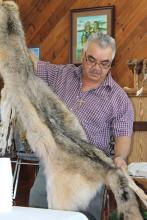
Charles Simard holds a timber wolf hide as he explains to the Partnership Circle participants in Manigotagan, Man., their relationship with the land along the eastern shores of Lake Winnipeg that has been their home for many generations. (Photo by Evelyn Rempel Petkau)
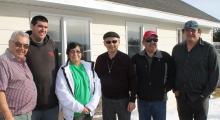
Members of Manigotagan Community Fellowship, Charles Simard, left, Chris Martin, Shirley Smith, Norman Meade, Dennis Sinclair and Danny Moneyas, host the spring Partnership Circles meeting on March 14, 2015. (Photo by Evelyn Rempel Petkau)


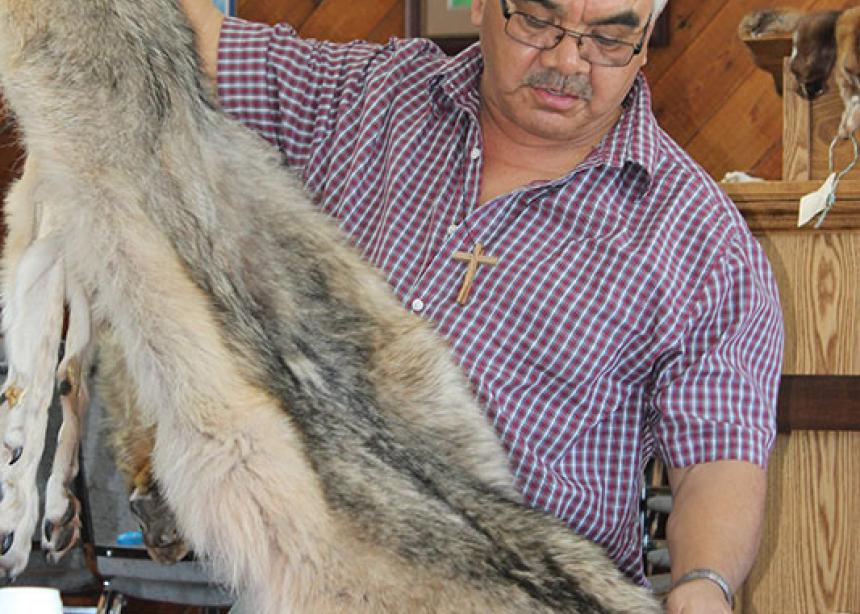


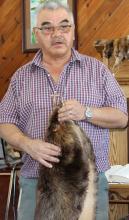
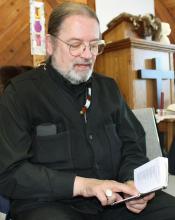
Add new comment
Canadian Mennonite invites comments and encourages constructive discussion about our content. Actual full names (first and last) are required. Comments are moderated and may be edited. They will not appear online until approved and will be posted during business hours. Some comments may be reproduced in print.